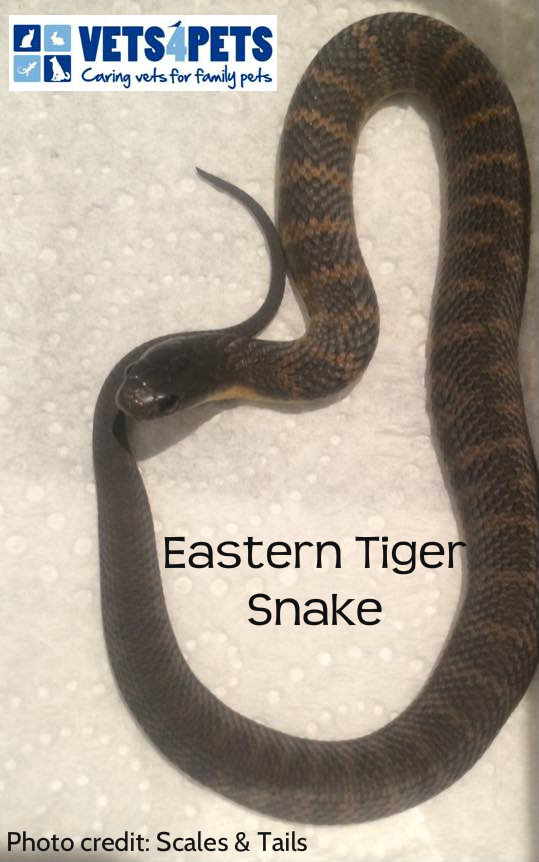It’s that time of year again; the sun is shining, it’s warming up and everyone is getting excited for summer! Unfortunately, it does bring with it the potentially deadly problem of snakes.
At Vets4Pets we have already seen a number of snake bite cases in both cats and dogs across the northern suburbs, including Angle Vale, Greenwith and Golden Grove. Brown and tiger snakes make up the majority of bites in South Australia. Snake bites are far more common in dogs and cats than in people; largely because our four legged companions don’t know to avoid them and think they are very exciting playthings!
Signs Of Snake Bite
Most of the time owners do not see the snake actually bite the animal; they either find the offending snake (usually with some teeth marks in it!) or just notice their pet acting unusually. If you do see your pet with a snake please remember not to put yourself or others at risk in order to try and identify the snake.
There are several factors which may determine what sort of reaction your pet will have to a snake bite. The type of snake, the amount of venom injected and the site of the snakebite are all contributing factors.
Dogs and cats are usually bitten around the head and legs, although the actual bite site is very rarely found.
The usual signs of a snake bite by a tiger or brown snake are:
- Sudden weakness followed by collapse
- Shaking or twitching of the muscles (causing affected animals to stagger)
- Drooling/vomiting
- Dilated (large) pupils
- As the toxins move through the body, a progressive paralysis may occur (animals may not be able to walk or even hold their head up)
- Breathing may become rapid and shallow
- Blood in urine or vomit
If your pet displays any of these signs or you have seen them playing with a snake it is vital that you seek veterinary attention immediately. Signs of snake bite may occur as shortly as 20 minutes after being bitten, although some animals may not show signs of being affected until up to 24 hours afterwards. Please do not attempt any first aid at home; the best plan of action is simply getting them to a vet! Vets4Pets have 7 different clinics located across the northern suburbs, including our emergency hospital at Golden Grove.
Treatment For Snake Bite
Once the vet diagnoses your pet as having been bitten by a snake they will determine what treatment is required. The mainstay of treatment is giving antivenom via an intravenous (IV) drip. Once the anti-venom has been given your pet will need to stay in hospital and its progress will be closely monitored. During this time fluids, pain relief and other medications may be given.
Prognosis
The prognosis for animals that have been bitten by a snake can range from good to extremely guarded depending on the speed of treatment and the severity of signs they show on presentation to a vet. The quicker that veterinary treatment is started the better the prognosis. With antivenom treatment 91% of cats and 75% of dogs survive snake bites within Australia each year.
Severely affected animals may take weeks to fully recover, however with prompt treatment most animals recover within a couple of days.
How To Prevent Snakes On Your Property
There is no 100% effective way to stop your animal from being bitten by a snake. However, by adhering to the following rules you will reduce the risk of snakes gathering on your property:
- Dig fences a foot into the ground.
- Keep your yard tidy? Clear away undergrowth, fill in holes in the ground, mow lawns regularly and clear away toys and tools (which make great hiding places for snakes)
- Keep walkways clear of brush, flowers and shrubs.
- Clean up any spilled food, fruit or bird seed (can attract rodents and therefore snakes)
Please remember to always seek professional help in the removal of a snake from your property.
